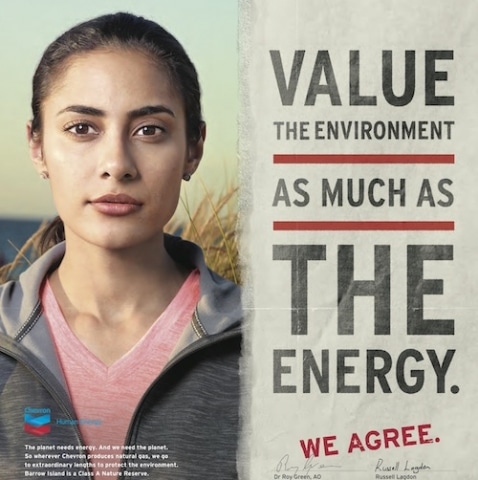Both online and on television, one of the world’s biggest oil and gas producers is telling Australians that it cares more about the environment than energy.
How this message might go down with the shareholders of Chevron is anyone’s guess. But then those people are possibly not the target for Chevron’s “We Agree” campaign.
The targets of this and other campaigns are Australians who might be thinking twice about the social licence to operate that is currently afforded to major fossil fuel companies.
Chevron’s ongoing campaign has been seen on SBS television and on satellite cable channels as well as featured banner ads on popular websites and in print.
The ads ask readers to “agree” to statements like “Value the environment as much as the energy” and “Make Australian Gas Benefit All Australia.”
Chevron’s multi-billion-dollar gas projects are in the country’s sparsely populated north west where opposition has been weaker than elsewhere.
But the Chevron messaging is just one chunk of a steady barrage of fossil fuel-funded PR flack being fired at Australians by some of the world’s biggest mining companies.
It appears the fossil fuel industry is feeling the pressure from repeated warnings in the scientific literature about the risks of continuing to exploit and burn fossil fuels.
Campaigners are also asking Australians to pull their cash out of fossil fuel companies for two reasons.
One argument is that profiting from fossil fuels is immoral at a time when the risks posed by climate change are increasingly evident.
Another is that the industry’s massive reserves will become unburnable stranded assets if (and it’s a big if) governments around the world decide to take strong action to rapidly cut emissions and/or the public becomes sufficiently aware of the existential risk of human-caused climate change.
And so the multi-million dollar PR blitz has begun.
Peabody Energy, which describes itself as “the world’s largest private sector coal company,” has a dedicated Australia site for its global “Advanced Energy for Life” campaign.
The campaign attempts to undermine the moral questions over coal by suggesting that instead, the dominant fuel is the answer to a different immorality question — global energy poverty.
Peabody chairman and CEO Gregory H. Boyce said: “Yet today, 3.5 billion people in the world lack adequate access to energy, and more than 4 million people needlessly die each year from the effects of energy poverty. We have the technologies and the global resources to end this crisis. All of us must work together toward realistic solutions.”
Boyce could not resist a dig at climate change science, when he added: “The greatest crisis we confront is not an environmental crisis predicted by computer models, but a human crisis fully within our power to solve. For too long, we have been focused on the wrong priorities.”
The Huffington Post’s Kate Sheppard revealed that the public relations muscle behind the Peabody campaign is Burson-Marsteller, one of the world’s biggest PR firms.
As Sheppard notes, Burson-Marsteller has worked with the tobacco industry, aided governments with questionable human rights records and helped Union Carbide spin the aftermath of its infamous Bhopal poisonous gas explosion that killed thousands and injured many more.
In Australia, the Peabody campaign is popping up on Google-served online advertising spaces where readers are taken to the campaign website. There, viewers are bombarded with headlines, graphics and coal-industry lobbying promoting the concept of “clean coal” and “energy poverty.”
“Renewables Pave Path to Poverty,” says one headline, linking to a column by Bjorn Lomborg in the Murdoch-owned The Australian newspaper.
On television, the Queensland Resources Council, representing mining and fossil fuel companies in the coal-friendly state, has launched national television adverts to counter concerns about the future of the Great Barrier Reef.
The United Nations World Heritage Committee is threatening to add the reef to its list of sites “in danger” and appears unconvinced that approvals to dump dredge spoil in waters off the reef are acceptable.
As I’ve written on The Guardian, the QRC campaign uses a scientific study which when read in full, undermines the fossil fuel lobby’s case.
In one of the more bizarre side issues, the Queensland Government has called for a boycott of Ben & Jerry’s ice cream for its support of the Fight for the Reef campaign from WWF-Australia and the Australian Marine Conservation Society.
Another web-based campaign — “Australians For Coal” — has come from the Minerals Council of Australia, the body that recently subsumed the lobby group Australian Coal Association.
The MCA includes global mining giants Rio Tinto, Peabody, GlencoreXstrata, BHP Billiton and AngloAmerican among its members.
According to MCA chief executive officer Brendan Pearson (a former lobbyist for Peabody), the reported multi-million dollar campaign will combat “a small number of noisy extremists” who were creating a “false impression that the community does not support Australia’s second largest export sector.”
The campaign, which will include television advertising, ran into trouble when a Twitter hashtag #australiansforcoal delivered some alternative messaging.
“Because I hate breathing fresh air, eating food and drinking clean water I’m with #australiansforcoal #auspol” said one Tweeter.
“Love the smell of coal dust in the morning – asthma, IQ loss, nerve damage – can our kiddies ask for more? #australiansforcoal” wrote another.
Subscribe to our newsletter
Stay up to date with DeSmog news and alerts






